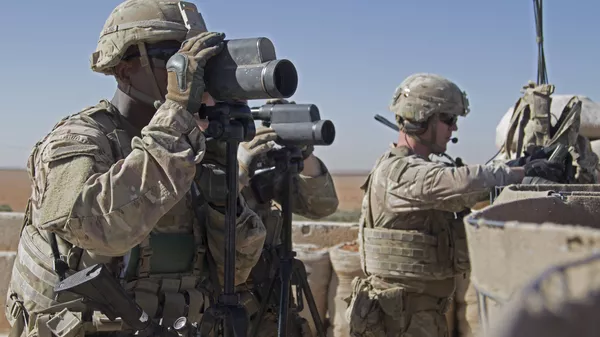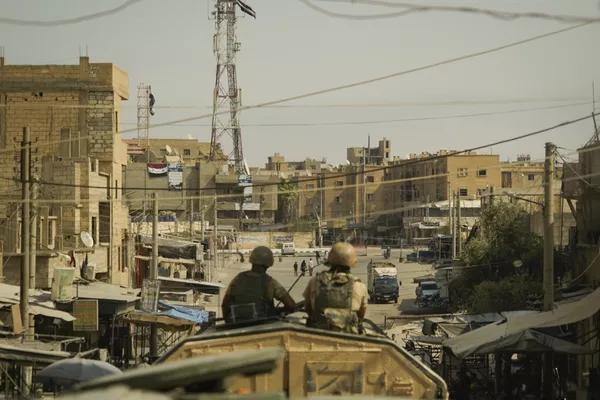
On 20 August, prominent members of Arab tribes in the northeastern Syrian city of Aleppo and vowed to support a popular resistance against US troops and their 'proxies', the Syrian Democratic Forces (SDF), who have been maintaining illegal bases in the oil-rich regions of Eastern Syria.
Thursday's statement came on the heels of the Arab Al-Uqaydat tribal summit in Deir ez-Zor Governorate which held the US-led coalition responsible for murdering tribal sheikhs in the area. Syrian tribal leaders gave the US military and the SDF a month to pull out of the region.
Meanwhile, the number of sporadic attacks against American and allied SDF military installations and convoys on the ground is soaring. On August 18, three small Kaytusha rockets exploded near a US Conoco base in Deir ez-Zor Governorate.
US Occupation Disrupted Supply Chains & Looted Syrians Resources
"What we are seeing is probably the beginning of an uprising against the US-led foreign intervention," suggests Ghassan Kadi, a Middle East expert and political analyst of Syrian descent. "Don’t forget that people of the Al-Hasakah, Deir ez-Zor, Raqqa, and Qamishli governorates have suffered immensely under ISIS (ISIL/Daesh)* and fought to liberate themselves from it, only to find themselves under another occupation that is based on American hegemony that is looting their resources and preventing the supply chain of food and basic necessities from reaching them. Needless to mention the huge drop in the Syrian Lira, which is causing an enormous increase in the cost of living."
The political analyst believes that the "Arab tribal militia" is perhaps more accurate and descriptive than the other term that is sometimes used, namely, the "Popular Resistance of the Eastern Region" aka "Popular Resistance in Raqqa". The latter is a paramilitary group headquartered in the province of Raqqa.
"This is an organised group that was formed under a different name by Suleiman Al-Shwakh," Kadi explains. "Al-Shwakh was assassinated in Damascus in August 2019 and his murder remains unsolved. He was a Syrian War veteran who had fought in Aleppo and Palmyra."
Still, the emerging resistance movement in northeastern Syria appears to be bigger than that, the expert believes.
"The spontaneous demonstrations of citizens of the region who are blocking US military routes with their bare hands is a stark indication that those citizens do not have to belong to an organised group to show their anger at the presence of those troops," he underscores.
Meanwhile, the same day when three missiles struck near Conoco, a Russian military convoy returning from a humanitarian mission was hit by an improvised explosive device (IED) near the At-Taim oil field, about 15 km outside the city of Deir ez-Zor. The blast claimed the life of a Russian major-general and left two troops injured.
However, according to Kadi, if the IED that killed General Asapov was built and placed by a northeastern resistance group, "then this would mean that this was a tragic accident", as the emerging resistance in northeast is not anti-Russian.
In the aftermath of the deadly explosion, the Russian Investigative Committee opened a case over the death of the major general and the injury of the two soldiers.

Trump Appears to be Lesser Evil for Syria Than Biden
"Whether the attacks on American and possibly SDF locations escalate into something bigger or not is anyone’s guess," the Middle East expert opines. "What does seem to be most likely is that they are not going to stop. History clearly shows that guerrilla warfare against occupiers can be effective and even if it remains sporadic, it almost invariably comes at a huge cost to the occupier. That said, my guess is that it will escalate."
One might wonder whether the anti-American resistance is being coordinated by some extraterritorial regional players. Responding to this question, Kadi notes that though the resistance, be it in under the wing of the organised Popular Resistance of the Eastern Region, tribal leaders or individuals, will take help from any sympathiser and supporter, as it is home-grown and grass-root in the first place.
"Sooner or later, American troops will have to leave Syria. They'll either choose to leave or the'll be forced to," he stresses.
Still it remains unclear how the US' Syria strategy will change after the 2020 elections and whether Donald Trump will deliver on his promise and withdraw American military personnel from the region if he wins in November.
"I believe that despite all the inexcusable and unforgivable atrocities of the Trump administration in Syria, and which include looting Syria’s oil, burning wheat crops, allowing Turkey to deprive the Al-Hasakah region from water for domestic use, just to name a few, Trump is the lesser evil", Kadi opines.
He does not rule out that the US incumbent president "was pushed to take actions he did not want to take and would rather withdraw".
"As for what a Joe Biden win can result into, with his weakness and diminishing mental faculties, he will most likely be a very pliable yes-man, putty in the hands of the deep state, its hawks, cronies, henchmen and beneficiaries," the analyst concludes.
*Daesh (ISIS/ISIL) is a terrorist organisation banned in Russia and many other countries.

